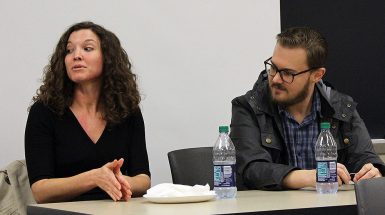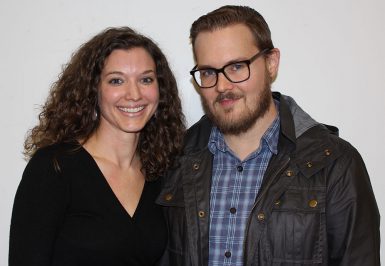Magazine editor, freelancer talk on freelancing

Writers and editors don’t always see eye to eye, but Ed at Indiana members had the chance to see how an editor and freelancer play off each other’s strengths during a special program Nov. 17.
The IU affiliate of the national magazine journalists’ group, Ed2010, hosted guest speakers Amanda and Justin Heckert. Amanda Heckert has been editor-in-chief at Indianapolis Monthly for four years, while her husband, Justin Heckert, freelances for national magazines such as Esquire and New York Times Magazine.
The pair visited campus to give advice to aspiring journalists interested in magazines in a “he said/she said” format.
“Editors won’t respond to you; don’t take it personally,” said Justin Heckert, who was City and Regional Magazine Association Writer of the Year in 2012.
Amanda Heckert said that she sometimes receives more than 100 emails a day, and story pitches for the magazine can get buried in the pile. To those freelancers pitching stories, they recommended touching base with editors again to make sure they saw the previous email.
Even then, responses from editors can vary.
“I worry about what they are going to say, because writing is often a personal experience,” Justin Heckert said of making a connection.
But persistence often pays off, especially at “city” or regional magazines, which often use freelancers for about 40 percent of their content, according to Amanda Heckert.
The ability to sell stories successfully begins with the quality of ideas. The Indy Monthly editor said she receives emails from prospective freelancers who expect the magazine to give them story assignments.
As a writer, her husband said he also has struggled with idea generation.
“I literally Googled ‘Ohio amazing stories,’ and I thought, ‘this is the low point in my career,’” he said, laughing.
But when an editor does accept your pitch, you still have challenges. Justin Heckert said some of these include writing to the style of the publication while maintaining your voice.
Some aspects of storytelling are universal, though. Like any good news story, “ the beginning has to sing,” he said.
His wife has read her share of stories that don’t sing. At all.
“By the end of that first section, if you have someone saying, ‘I’m not going to read the rest of it,’ you’re in trouble,” she said.

This is where the relationship between writers and editors play a pivotal role. Editors help writers through the sometimes labor intensive process of writing a really engaging story.
“I feel like I’m trying to write a perfect first draft,” Justin Heckert said, and that’s where a good editor can help you find your way.
While students sometimes try their hands at freelancing, the duo recommended internships as good ways to get your foot in the door.
“Interns can expect to do a lot of fact-checking, but each intern at Indianapolis Monthly has a mentor on staff,” said Amanda Heckert. “I encourage interns to invite other staffers to lunch or coffee and suck as much information from them as possible.”
Indianapolis Monthly also gives interns the opportunity to write.
“Take every opportunity you have to write or edit very seriously. You never know where those seemingly small stories will lead,” she said.
Ed2010 was founded by alumna Chandra Czape Turner, BAJ’96, to help aspiring magazine editors cultivate careers and find jobs. Turner now is executive editor at Parents magazine. Previously, she was executive editor of CosmoGirl, and she was an editor at Ladies’ Home Journal, Cosmopolitan, YM and Glamour.
More:

